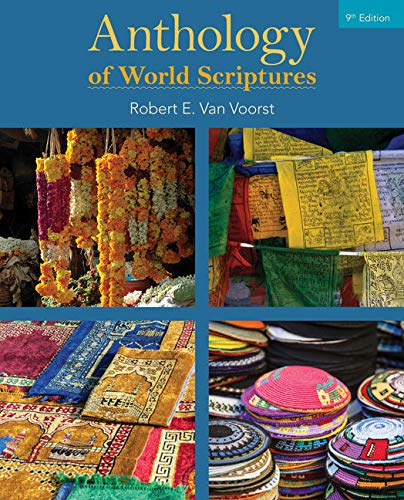Test Bank For Anthology of World Scriptures 9th Edition by Robert E. Van Voorst
Digital item No Waiting Time Instant DownloadISBN-10 : 130558449XISBN-13 : 978-1305584495Publisher : Cengage Learning; 9th editionauthor: Robert E. Van Voorst
In Stock
Original price was: $55.00.$18.00Current price is: $18.00.
Test Bank For Anthology of World Scriptures 9th Edition by Robert E. Van Voorst
Table of Contents
Test Bank for Anthology of World Scriptures, 9th Edition by Robert E. Van Voorst
The “Test Bank for Anthology of World Scriptures, 9th Edition” by Robert E. Van Voorst is a comprehensive educational resource designed to support educators and students in the study of the world’s major religious texts. This test bank complements the textbook by providing a wide range of questions that assess and reinforce understanding of key concepts related to religious scriptures from various traditions. Below is a detailed overview of the components and benefits of this test bank:
Overview of Test Bank Content
- Chapter-by-Chapter Organization
- The test bank is meticulously organized to align with each chapter of the textbook, ensuring thorough coverage of all critical topics. This organization facilitates easy integration into the curriculum and enables targeted assessments.
- Types of Questions
- Multiple-Choice Questions (MCQs): These questions assess a broad spectrum of knowledge, from basic recall to complex application and critical thinking. Each question includes well-crafted distractors to challenge students’ understanding and reasoning.
- True/False Questions: These questions evaluate students’ ability to differentiate between correct and incorrect statements, reinforcing factual knowledge and addressing common misconceptions.
- Fill-in-the-Blank Questions: These questions focus on recalling specific details such as key terms, concepts, and significant passages, testing students’ memory and understanding.
- Short Answer Questions: These questions require detailed yet concise responses, evaluating students’ ability to explain religious concepts and scripture clearly and accurately.
- Essay Questions: These questions assess students’ ability to synthesize and articulate complex ideas, demonstrating a deep understanding of the religious texts and their contexts.
- Case Studies and Scenarios: Real-world scenarios and case studies help students apply theoretical knowledge to practical situations, enhancing their critical thinking and problem-solving skills.
- Difficulty Levels
- Questions are categorized by difficulty to provide a range of challenges and assess students’ proficiency at different levels. This includes:
- Basic: Testing foundational knowledge and comprehension.
- Intermediate: Requiring application of knowledge to interpret and analyze scriptures.
- Advanced: Involving critical thinking, analysis, and synthesis of complex religious texts and ideas.
- Questions are categorized by difficulty to provide a range of challenges and assess students’ proficiency at different levels. This includes:
- Core Focus Areas
- Introduction to World Religions: Questions covering the basic principles and scope of world religions, including the significance of scriptures in various religious traditions.
- Hinduism: Detailed coverage of key texts such as the Vedas, Upanishads, Bhagavad Gita, and Ramayana, including their historical context and core teachings.
- Buddhism: Assessing knowledge of primary texts such as the Tripitaka, Mahayana Sutras, and teachings of the Buddha, including key concepts like the Four Noble Truths and the Eightfold Path.
- Confucianism and Daoism: Questions on Confucian Analects, Dao De Jing, and other significant texts, exploring their philosophical and ethical teachings.
- Judaism: Coverage of the Hebrew Bible, including the Torah, Prophets, and Writings, with a focus on major themes and historical context.
- Christianity: Examining the Old and New Testaments, including the Gospels, Epistles, and Revelation, with emphasis on key teachings and historical developments.
- Islam: Questions on the Quran, Hadith, and other significant texts, including the Five Pillars of Islam and key theological concepts.
- Sikhism: Assessing understanding of the Guru Granth Sahib and other key texts, including the teachings of the Sikh Gurus.
- New Religious Movements: Questions on the scriptures and teachings of newer religious movements, exploring their origins and key beliefs.
- Contextual and Comparative Analysis
- Questions encouraging comparative analysis of scriptures across different religions, exploring similarities, differences, and the role of context in shaping religious texts.
- Ethical and Philosophical Discussions
- Assessing students’ understanding of ethical and philosophical teachings within various scriptures, and how these teachings influence contemporary religious practice.
- Cultural and Historical Context
- Questions focusing on the cultural and historical context of each religious tradition, helping students understand the development and impact of these scriptures over time.
- Interpretation and Exegesis
- Evaluating students’ ability to interpret and analyze passages from various scriptures, applying critical thinking and exegesis techniques.
Benefits of Using the Test Bank
- Enhanced Learning and Retention
- The diverse range of question types and difficulty levels helps reinforce learning through varied and repeated exposure to key concepts, enhancing retention and understanding.
- Preparation for Real-World Applications
- By focusing on real-world scenarios and practical applications, the test bank prepares students for the practical aspects of studying and interpreting religious texts, ensuring they are ready to apply their knowledge in academic and professional settings.
- Comprehensive Assessment
- The test bank allows for thorough and multi-faceted evaluation of students’ knowledge and skills, from basic understanding to advanced application, ensuring a well-rounded educational experience.
- Efficient Teaching Resource
- For educators, the test bank simplifies the process of creating assessments, providing a consistent and reliable tool for evaluating students’ progress and readiness for advanced studies in religious studies.
Conclusion
The “Test Bank for Anthology of World Scriptures, 9th Edition” by Robert E. Van Voorst is an essential resource for the study of world religions and their scriptures. It provides structured, comprehensive, and versatile tools for assessing and enhancing students’ knowledge and skills in religious studies. By aligning closely with the textbook and emphasizing real-world application, the test bank supports the development of competent, confident scholars ready to excel in their understanding and interpretation of religious texts from around the world.
4o


Reviews
There are no reviews yet.